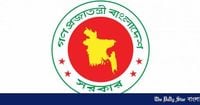The government of Bangladesh has announced an ambitious plan to swiftly fill 16,000 vacant positions across various ministries, including the Ministry of Health, Ministry of Education, and Ministry of Primary and Mass Education. This decision comes in response to a special meeting convened by three advisors and six secretaries, aimed at addressing the pressing need for staffing in critical sectors.
On Sunday, the meeting took place at the Ministry of Jiban, chaired by Muhammad Fauzul Kabir Khan, a member of the Public Administration Committee. Attendees included advisors from the relevant ministries, the cabinet secretary, and senior officials from the Ministry of Public Administration. During the meeting, it was confirmed that the government plans to appoint 6,000 doctors, with an urgent recruitment drive to fill 2,000 positions through a special BCS exam by September.
"All ministries and departments are being instructed to take immediate action regarding the necessary recruitment for vacant posts," Khan stated in an interview with The Daily Star. This directive aims to expedite the hiring process that has lagged despite the government's previous commitments to fill these roles.
The Ministry of Health has reported that 2,300 nurses are currently in the recruitment process, with plans to hire an additional 3,500 nurses once this phase is completed. Meanwhile, the Ministry of Primary and Mass Education has indicated that the promotion of 30,000 assistant teachers is currently stalled due to legal issues. However, a court hearing scheduled for April 23 could resolve these complications, allowing the recruitment of an equal number of assistant teachers in government primary schools to proceed.
In the realm of secondary and higher education, the recruitment of 2,876 teachers is also underway, with further initiatives planned to recruit more teachers through a special BCS if necessary. Khan emphasized the urgency of these recruitments, stating, "This meeting has highlighted the need for swift action in several ministries, particularly in health and education."
In addition to filling cadre positions, the government has decided to establish a separate Public Service Commission (PSC) for non-cadre positions. A senior official at the meeting explained that the complexity of recruiting non-cadre government employees has left many positions unfilled. "Despite the government's directives for rapid recruitment, progress has been slow," he noted, underscoring the necessity for a dedicated PSC to streamline the process.
Currently, the Ministry of Public Administration's statistics indicate that there are 3,71,790 government posts available, with 1,99,361 of these positions classified for employees in grades 11 to 20. These represent the majority of government employees, accounting for 71% of the total workforce. According to the constitution, the PSC is responsible for verifying and conducting examinations for suitable candidates for employment in the republic. Section 16 (1) of the constitution allows for the formation of multiple PSCs for the recruitment of civil servants.
In a related development, the Bihar Staff Selection Commission (BSSC) in India has also announced a recruitment drive for Field Assistants under the Directorate of Agriculture. This initiative aims to fill 201 vacancies and will commence on April 25, 2025, with applications accepted until May 23, 2025.
Interested candidates can apply online through the BSSC's official website, with specific eligibility criteria including a minimum age of 18 and educational qualifications such as passing the Intermediate Science or holding a Diploma in Agriculture. The selection process will involve a preliminary examination, followed by a main examination and document verification.
The application fees vary based on the candidate's category, with general category applicants required to pay ₹540, while SC/ST and female candidates from Bihar will pay ₹135. The recruitment process highlights the ongoing efforts by various governmental bodies to address employment needs in their respective sectors.
As both Bangladesh and India navigate their staffing challenges, the urgency of filling these vacancies underscores the critical need for effective governance and public service delivery. The swift recruitment processes initiated by both governments reflect a commitment to enhance the efficiency and effectiveness of public services.





